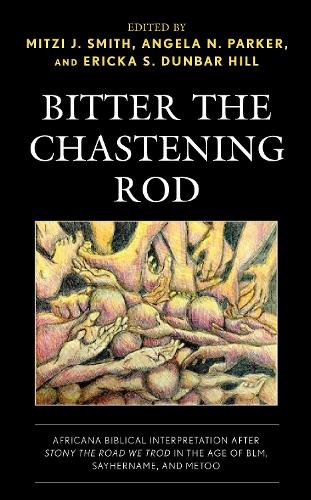
Bitter the Chastening Rod: Africana Biblical Interpretation after Stony the Road We Trod in the Age of BLM, SayHerName, and MeToo
(Hardback)
Publishing Details
Bitter the Chastening Rod: Africana Biblical Interpretation after Stony the Road We Trod in the Age of BLM, SayHerName, and MeToo
By (Author) Mitzi J. Smith
Edited by Angela N. Parker
Edited by Ericka S. Dunbar Hill
Contributions by Brian K. Blount
Contributions by Theodore W. Burgh
Contributions by Allen Dwight Callahan
Contributions by Ronald Charles
Contributions by Stacy Davis
Contributions by Ericka S. Dunbar Hill
Contributions by Dennis R. Edwards
Bloomsbury Publishing PLC
Lexington Books/Fortress Academic
28th February 2022
United States
Classifications
Professional and Scholarly
Non Fiction
Criticism and exegesis of sacred texts
Ethnic studies / Ethnicity
Social and cultural history
220.608996
Physical Properties
Hardback
298
Width 160mm, Height 228mm, Spine 28mm
621g
Description
Bitter the Chastening Rod follows in the footsteps of the first collection of African American biblical interpretation, Stony the Road We Trod (1991). Nineteen Africana biblical scholars contribute cutting-edge essays reading Jesus, criminalization, the enslaved, and whitened interpretations of the enslaved. They present pedagogical strategies for teaching, hermeneutics, and bible translation that center Black Lives Matter and black culture. Biblical narratives, news media, and personal stories intertwine in critical discussions of black rage, protest, anti-blackness, and mothering in the context of black precarity.
Reviews
Since African American biblical interpretation is unapologetically contextual, the contributors of Bitter the Chastening Rod engage the cultural history of Black peoples in the U.S. and diaspora, raising new questions about humanity, discipline, and culture amidst social movements such as #BLM, #SayHerName, and #MeToo. Consequently, this collective work of Africana biblical critics emerges as an assemblage of culturally informed knowledge of the text and history, innovative deployments of theories and hermeneutics, and emancipatory pedagogy grounded in praxis. It demonstrates the perseverance, resilience, and brilliance of generations of Black biblical scholarship. As Stony the Road We Trod opened the path not only for Black scholarship but also for other minoritized scholars, this volume is a must-read for all biblical scholars and an invaluable source for faith communities to join the struggle for justice in our time.
-- Jin Young Choi, Colgate Rochester Crozer Divinity SchoolBitter the Chastening Rod provides creative paths to the hackneyed roads that whitestream scholarship has built for Biblical Studies. We are in dire need of imaginative interpretive exercises that challenge how whiteness has pervaded historiography, linguistics, and literary analysis. We also need visionary models to build graduate programs, curriculums, and educational practices attentive to a world facing unprecedented global crises. Bitter the Chastening Rod suggests new paths for such enterprise.
-- Luis Menndez-Antua, Boston University School of TheologyThis compelling sequel of the seminal Stony the Road we Trod proves the pressing relevance of Africana hermeneutics at this historical moment. These diverse readings offer a review of the work of pioneers; bold, historically grounded, and tragically relevant interpretations of individual texts about incarceration and violence; and important challenges to comfortable readers. No New Testament scholar, seminarian, or Christian should look away from the opportunities to enact justice that this volume presents.
-- Candida Moss, University of BirminghamBitter the Chastening Rod: Africana Interpretation After Stony theRoad we Trod in the Age of #BLM, #SayHerName, and #MeToo is a greatly anticipated volume that, in the spirit of Sankofa, builds upon, expands, and futures Black post-colonial biblical studies. The aggregation of renown scholars that pen this work offers brilliant insights on the biblical text and prophetic movements against subjugation. This important text engages the longstanding and ongoing work of confronting interlocking forms of oppression in the US and globally, centering the continuing need to illuminate connections between Africana biblical studies and the hermeneutical lenses of current revolutionary struggles. It is a must-read that informs any serious engagement of the theological disciplines and meaningful social action.
-- Maisha I. K. Handy, executive director of the Jacquelyn Grant Center for Black Womens Justice and associate professor of Religion and Education, Interdenominational Theological CenterThe pioneers of Black biblical scholarship have proudly passed the torch to an equally agile cohort of troublers who ably take up the call to challenge the still prevailing hermeneutic of whiteness. For me, a white scholar, BCR is the companion piece Ive been waiting for. I owe these contributors not only a great debt of gratitude for such an essential resource but also my undivided attention and resolve as I trod my own hermeneutical trek.
-- William P. Brown, Columbia Theological SeminaryAuthor Bio
Mitzi J. Smith is the J. Davison Philips Professor of New Testament at Columbia Theological Seminary in Decatur, GA.
Angela N. Parker is assistant professor of New Testament and Greek at Mercer Universitys McAfee School of Theology in Atlanta, GA.
Ericka S. Dunbar Hill is visiting professor of Hebrew Bible at Payne Theological Seminary in Wilberforce, OH.
